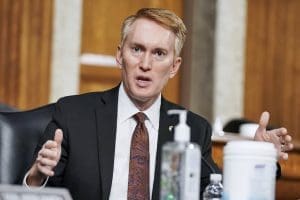GOP frets about inflation but rejects Biden plan to lower it
Republicans across the board have criticized the Build Back Better framework as reckless, despite expert analysis showing it would curb inflation long-term.

Congressional Republicans have cited concerns about rising inflation as one of several reasons to oppose President Joe Biden’s Build Back Better plan, a $1.75 trillion framework for climate change and caregiving infrastructure investments.
Nobel Prize-winning economists, however, say the plan would actually help curb long-term inflation.
For months, Republican lawmakers have tried to pin rising prices during the pandemic recovery on Biden and his as-of-yet mostly unpassed legislative agenda. Many have taken to calling it “Bidenflation.”
Since Biden announced the $1.75 trillion framework in late October, the GOP has unanimously lined up against it, parroting accusations that its enactment would make things even worse.
“Democrats want to spend trillions of dollars during an inflation crisis. Ridiculous!” Colorado Rep. Ken Buck tweeted on Wednesday.
“Inflation is continuing to surge across the country. And middle-class working families are really feeling the pinch,” Ohio Sen. Rob Portman wrote. “The last thing we Congress should do at this juncture is force through a massive tax and spending bill that will send prices soaring even further.
Oklahoma Sen. James Lankford claimed the plan was “actually just a huge entitlement package that will result in: Skyrocketing debt and deficit, Inflation caused by Dems reckless spending, [and] Trillions in new entitlement spending.
The White House estimates the plan’s offsets will actually reduce the annual budget deficit.
Biden initially proposed a $3.5 trillion Build Back Better package to help speed the nation’s economic recovery. In September and October, he cited 15 Nobel Prize-winning economists to argue that that investment would actually help reduce long-term inflation. With some conservative congressional Democrats balking at that price tag and every Republican in opposition, he and the Democratic majority agreed to cut that topline in half.
On Thursday, a Washington Post fact checker surveyed those same economists to see whether they believed the scaled-down $1.75 trillion framework would help control inflation. Most of those who responded predicted that it would.
“Because this agenda invests in long-term economic capacity and will enhance the ability of more Americans to participate productively in the economy, it will ease longer-term inflationary pressures,” Columbia University professor Joseph Stiglitz told the outlet.
“If by reduce inflation you mean inflation would be lower than otherwise, that is consistent with the statement,” concurred Massachusetts Institute of Technology professor Peter Diamond, referencing the notion that the proposal’s public investments will help slow the problem.
“The package would still reduce ‘longer-term inflationary pressures,’ even with some of its revenue-raising measures reduced, because of the supply-side effects it lists,” added Princeton University professor Christopher Sims, noting “the risk to the economy of not passing this legislation, thereby reinforcing the view that our institutions can’t act to deal with our central economic problems.”
Meanwhile, other experts have said that the current rate of inflation is not necessarily Biden’s fault and has little to do with his economic policies.
Financial adviser Craig Kirsner told Forbes in August that the two main reasons for the current inflation were the reopening of the economy after 18 months of the pandemic slowed spending, which likely caused “a bottleneck with very high demand,” and low interest rates spurring housing demand and “a large backlog.”
Investment manager John Micklitsch said the inflation was fueled by “a perfect storm of supply chain disruption from COVID, government spending to fill the economic void, and a synchronized global recovery driven by vaccine rollout and economies re-opening,” after more than “a decade of underinvestment in the global commodity supply chain.”
The House is expected to vote on both the Build Back Better plan and the $550 billion bipartisan Infrastructure Investment and Jobs Act in the coming days. Washington Rep. Rick Larsen (D) told Reuters on Wednesday that the vote could come as soon as Nov. 5.
“We were told it could be done as soon as noon on Friday,” he said. “When you line it all up, that’s the timeline.”
Published with permission of The American Independent Foundation.
Recommended

Biden calls for expanded child tax credit, taxes on wealthy in $7.2 trillion budget plan
President Joe Biden released his budget request for the upcoming fiscal year Monday, calling on Congress to stick to the spending agreement brokered last year and to revamp tax laws so that the “wealthy pay their fair share.”
By Jennifer Shutt, States Newsroom - March 11, 2024
December jobs report: Wages up, hiring steady as job market ends year strong
Friday’s jobs data showed a strong, resilient U.S. labor market with wages outpacing inflation — welcome news for Americans hoping to have more purchasing power in 2024.
By Casey Quinlan - January 05, 2024
Biden’s infrastructure law is boosting Nevada’s economy. Sam Brown opposed it.
The Nevada Republican U.S. Senate hopeful also spoke out against a rail project projected to create thousands of union jobs
By Jesse Valentine - November 15, 2023








































































